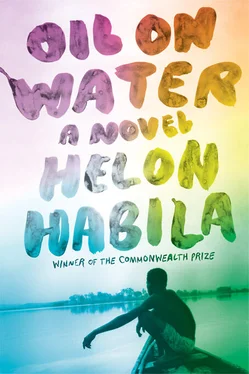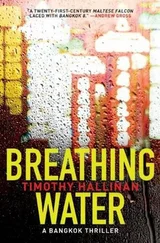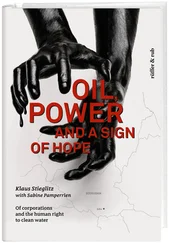But that was a dangerous thought, an illusion — like a drowningman letting down his guard at the sight of shore, deceived by the promise of safety, and drowning as a consequence. We were still deep in militant territory and, as if to remind me of this, the militants came. They must have been watching us and waiting, as we were, for nightfall. They waited until all the boats were loaded and everyone was on board and about to sail before they appeared. The roar of their speedboats was deafening, the glare of their flashlights blinded our eyes and threw the women and children into panic and confusion. Some of the women and children started to jump into the shallow water, some threw themselves below the benches, but, above the cries and wails of women and even men, one voice rose and tried to maintain calm — it was Chief Ibiram’s, from the lead boat. I could see his silhouette as he stood up, his arms raised.
— Calm down. Sit still. Everybody, sit down.
The militants said nothing and continued to circle in their boats, blocking all avenues of sudden escape, and then at last, when the noise had gone down a bit, a man in one of the boats stood up and shouted over the water:
— We want the white woman now. Give us the white woman and her driver and we won’t harm you. If you don’t we will sink all your boats and set fire to your things. If you tink say na joke, try us.
I was in Tamuno’s boat with Isabel and Salomon. We were sitting side by side, and behind us father and son watched and waited in silence. I waited. And then the man started to count:
— One, two, three. .
The third count was accompanied by gunfire aimed into the cloudy night sky. Isabel stood up, holding on to my shoulder for balance, and I could feel how her hand shook. And when she spoke her words were almost a sob:
— I. . am here. Please. . don’t shoot. I’m here.
The light fell on her. She removed the black scarf covering her chopped hair, and with the other hand she covered her eyes from the blinding flashlight.
— Bring her here. Now!
This was accompanied by another wild gunshot into the sky. The old man lowered his oar into the water and rowed, and slowly we went past the other boats, past the neutral space between our men and the militants, and then we were with them. Two men jumped out of a boat, still holding their guns on us, and helped Isabel out and into their boat.
— Where is the driver?
Salomon stood up and, in trying to get out, fell into the water and came up again, gasping for breath. The two men pulled him out and pushed him onto a seat next to Isabel, and then, when we thought it was over, the leader of the militants let off another shot into the sky.
— Chief Ibiram, why did you do this? Are you now on their side? Are you trying to take her back to get a reward, is that so?
— It is not so. We are only trying to help her. She came to us and begged—
— She came to you, then you should have known what to do. Tell me, what should you have done when my prisoner escapes and comes to you? I can’t hear you. Louder!
— I should have come to you. I am sorry. This will not happen again.
— You are right, it will not happen again. To make sure it doesn’t I will take one of you with me. Just as insurance. When we are sure you haven’t gone to the government soldiers to betray us, he will be released. You decide who.
I noticed Tamuno inching closer to his son and putting a protective arm around him; I was sure that behind me, in the other boats, mothers were wrapping their arms around their children, and fathers were lowering their heads in anxiety.
— Chief, we are waiting. One, two, three. .
Again a flash and the rude sound of gunfire, followed by silence. I could imagine Chief Ibiram in his boat, and the million things going through his mind.
— Well, since no one is willing to come, we will take this boy here.
And again the two men jumped into the water and came to our boat.
— Nooo! Abeg. Please! Noo!
The cry came from the old man as the men approached our boat; he threw himself at them as they began to drag Michael out of the boat, his puny arms rising and falling ineffectually against the men’s burly frames, but still he fought them, his rage churning up the water. The boy grabbed tightly on to my arm, screaming for his father. I saw a gun rise and then descend on the old man’s head and he slumped against the boat and then into the water. Slowly I stood up, my arms raised. An image of the boy proudly scrawling his name in the sand came to my mind, and it seemed like just yesterday. The old man had served us diligently in the hope that we’d take his son to Port Harcourt and a better future, and instead we had led him to incarceration and being doused in petrol. Now the old man lay faceup in the water, and his son was about to be taken away.
— I will go. Take me. Leave the boy alone.
I got into the water and helped Tamuno back into the boat. Then the two men took my arms and we waded to their boat, where they shoved me in beside Salomon and Isabel.
THEY WERE THE MASTERS of the waterways — they knew every turning, every shallow, every rapid; many times I expected our boat to crash into some shadowy form looming suddenly in front of us — a tree, a rock — but our boat would effortlessly curve away into the darkness and into an open expanse of water and the men would let their guns roar as if in defiance of danger and death. There were five boats with four men in each, all armed, all eager to shoot off a few rounds at the slightest opportunity. Salomon and Isabel and I hung on for dear life as the boats ate up the darkness. I had expected a blindfold, but nobody paid me or my fellow prisoners any attention once we left Chief Ibiram and his people.
Our destination turned out to be closer than I had anticipated — we got there in under thirty minutes, and even in the dark I could appreciate how impregnable the approach to land was. It was one solid slab of granite rising sheer from the water, and not till we left the boats did I see the tiny steps cut into the rock face; they looked no more than hand- and toeholds, but they were cut in a curving zigzag, making the climb easier than one would have expected, yet still daunting to someone not fully recovered from a fever, and hungry, and prodded by guns in the back, and unsure of whatever lay in store. Our arrival was announced by more gunshots and whoops and calls, but the camp was clearly asleep. A few fires burned to illuminate makeshift sheds and tents, and two sentries appeared suddenly from behind trees, their presence indicated only by the inevitable cigarette between their lips. Salomon and I were dumped under a tree, while Isabel was led away to a group of tents. Although we couldn’t see any guards in our immediate vicinity, I knew they were there, shadowy, watching, waiting. I turned to my companion, but he had dragged himself to the foot of the tree and was seated with his back against it, his head lowered to his knees, and after a while I realized he was sobbing.
— Salomon, are you all right?
He said nothing, and I decided to let him cry in peace. I could imagine how terrified he must be. After all, he had helped the woman escape, and he knew a terrible punishment awaited him in the morning. I hoped he would be composed enough to grant me an interview before they came for him. . for us. I was aware that unless I could prove I was a journalist, and that I could be useful to the militants with my piece, my fate wouldn’t be any better than Salomon’s. I lay on my back and closed my eyes, but that night sleep didn’t come easily.
IN THE MORNING I was awakened by a kick in the ribs. I sat up, holding my aching side, and saw a man with a gun standing over me. He said nothing, only motioned with his gun. He wanted me to stand up. I stood up. Salomon was already on his feet, and from his swollen and bloodshot eyes I could tell he hadn’t slept much last night.
Читать дальше












